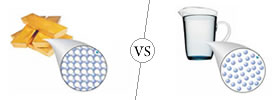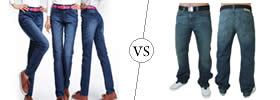Difference between Soap and Detergent
Key Difference: Soaps and detergents, both products have been designed to work as cleansing agents or surfactants. They are very similar in context to structure and function. Soaps are made up of items which are found in nature. However, most of the detergents are synthetic. Soaps are commonly used as surfactants for bathing. However, there are other soaps too which are used for cleaning and washing. Detergents are surfactants for dishwashing and fine fabric laundering.
 Soap is a cleansing agent. They are water soluble sodium or potassium salts of fatty acids. They are composed from fats and oils, or their fatty acids which are treated with Iye. Soft or liquid soap make use of potassium hydroxide in place of Iye. Solid fats like palm oil and coconut oil form hard soaps, whereas oils like olive oil and soybean oil are used for forming mild and soft soaps.
Soap is a cleansing agent. They are water soluble sodium or potassium salts of fatty acids. They are composed from fats and oils, or their fatty acids which are treated with Iye. Soft or liquid soap make use of potassium hydroxide in place of Iye. Solid fats like palm oil and coconut oil form hard soaps, whereas oils like olive oil and soybean oil are used for forming mild and soft soaps.
The methods of soap making are often termed as saponification, in which fats and oils are heated and then they are reacted with a liquid alkali. This process produces soap and water with glycerin. However, there are some other soap making processes too.
 Detergent is also a surface active agent like soap. However, soaps and detergents are very different from each other. Soaps are generally composed of materials which are present in nature. However, most of the detergents are synthetic.
Detergent is also a surface active agent like soap. However, soaps and detergents are very different from each other. Soaps are generally composed of materials which are present in nature. However, most of the detergents are synthetic.
Detergents came into existence during World War II, due to inadequate supply of oils for soap formation. They are basically non-alkaline carbonic compounds. Soap and detergents are often used interchangeably as both contain substances which lessens surface tension of water. As soaps are natural, they are biodegradable. Thus, they are not considered to be as harmful as synthetic detergents.
Molecules of soap and detergent are able to emulsify or disperse water insoluble materials like dirt, grease, oil, etc. Soap and detergents hold these water insoluble materials in water. Laudry detergents generally contain many chemicals and are also scented with cheap and synthetic fragrances.
Soaps have been around since a very long time (thousands of years) whereas, detergents have recently gained popularity (50-60 years). Soaps are not a threat for environment. On the other hand, detergents cause environmental pollution. Soaps are more effective when used with warm water. On the other hand, detergents work the same in cold and warm water both. Unlike detergents, soaps are not capable of producing bubbles, and thus results in the wastage of soap. There are many types of soaps used for different purposes related to cleansing activities. However, commonly soaps are used for bathing, whereas detergents are commonly used for dishwashing and fine fabric laundering.
Comparison between Soap and Detergent:
|
|
Soap |
Detergent |
|
Definition |
Soaps are sodium salts of long chain caroboxylic acids |
Detergents are sodium salts of long chain benzene sulphonic acids or alkyl sulfate |
|
Obtained from |
Soap is a cleansing agent, which is made from animal or vegetable fats and oils combined with a strong alkali |
Detergents are generally synthetic, and are made from petro-chemicals |
|
Reaction with hard water |
It produces scum in hard water which affects its cleansing action |
Not affected with hard water. The cleaning action remains to be the same |
|
Environment-friendly |
Biodegradable |
Not much biodegradable |
|
Cost |
Generally, they are cheaper |
Generally, they are costly |
|
Bubble formation |
Cannot produce bubbles in hard water |
Forms bubbles in both soft and hard water |
Image Courtesy: sheertreasures.com, thelaundrycenter.com









Comments
Very Useful Article. Thank you
KIRENAP
Sun, 03/29/2015 - 23:32
Add new comment